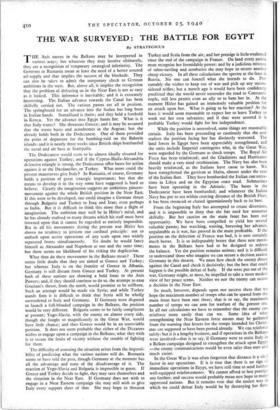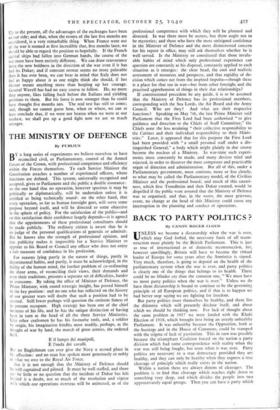THE WAR SURVEYED: THE BATTLE FOR EGYPT
By STRATEGICUS
HE Axis moves in the Balkans may be interpreted in various ways; but whatever they may involve ultimately, they are a recognition of temporary strategical inferiority. The Germans in Rumania mean at least the need of a better assured oil-supply and that implies the success of the blockade. They can also be taken to admit the temporary check to German ambitions in the west. But, above all, it implies the recognition that the problem of defeating us in the Near East is not as easy as it looked. This inference is inevitable; and it is extremely interesting. The Italian advance towards the Canal has been skilfully carried out. The various pawns are all in position. The springboard for an advance into the Sudan has long been in Italian hands. Somaliland is theirs; and they hold a foothold in Kenya. Yet the advance into Egypt hangs fire. What is it that Italy wants? She threatens Greece; and it may be assumed that she wants bases and aerodromes in the Aegean; but she already holds both in the Dodecanese. One of them provided the point of departure for the bombing-raid on the Bahrein islands; and it is nearly three weeks since British ships bombarded the naval and air base at Stampalia.
The Dodecanese would seem to be almost ideally situated for operations against Turkey; and if the Cyprus-Haifa-Alexandria defensive triangle is strong, the Dodecanese offer bases for action against it or the Dardanelles, or Turkey. What more could the present manoeuvres give Italy? In Rumania, of course, Germany holds a position of great strategic importance; but that she means to develop it in the way some have suggested is hard to believe. Clearly the imagination suggests an ambitious pincers- movement against the whole British position in the Near East. If this were to be developed, one could imagine a German thrust through Bulgaria and Turkey to Iraq and Iran; even perhaps to India. But it is difficult to think this more than a flight of imagination. The ambition may well be in Hitler's mind, and he has already realised so many dreams which his staff must have frowned upon that it cannot be regarded as entirely impossible. But in all his movements during the present war Hitler has shown no tendency to jettison one cardinal principle : not to embark upon active operations of any scale upon two widely separated fronts simultaneously. No doubt he would fancy himself as Alexander and Napoleon at one and the same time; but there seems no likelihood of his risking the duplication.
What then do these movements in the Balkans mean? There seems little doubt that they arc aimed at Greece and Turkey; but whereas Italy is on the frontier of Greece in Albania, Germany is still distant from Greece and Turkey. At present both of these nations are showing a bold front to the Axis Powers; and, if they should continue to do so, the attempt to ease Graziani's thrust, from the north, would promise to be stillborn. Such an attempt would be made via Syria; and while Turkey stands firm it is difficult to think that Syria will be wholly surrendered to Italy and Germany. If Germany were disposed to launch a full-blooded campaign in the Balkans, the position would be very different. Bulgaria seems to be fairly complacent at present; Yugo-Slavia, with the enemy on almost every side, though she fought so magnificently in the Great War, would have little chance; and then Greece would be in an unenviable position. It does not seem probable that either of the Dictators wishes to engage upon a campaign in the Balkans; what they wish is to secure the fruits of victory without the trouble of fighting for them.
The difficulty of assessing the situation arises from the impossi- bility of predicting what the various nations will do. Rumania seems to have sold the pass, though Germany at the moment has all the advantage and none of the disadvantage of it. The reaction of Yugo-Slavia and Bulgaria is impossible to guess. If Greece and Turkey decide to fight, they may save themselves and the situation in the Near East. If Germany does not wish to engage in a Near Eastern campaign she may still wish to give Italy every support short of that- She may hope to threaten Turkey and Syria from the air; and her prestige is little weakened since the end of the campaign in France. On land every nation must recognise her formidable power; and by a judicious mixture of sabre-rattling and aerobatics she may hope to secure another cheap victory. In all these calculations the spectre at the feast is Russia. No one can foretell what she intends to do. Pre- sumably she wishes to keep out of war and pick up any uncon- sidered trifles; but a month ago it would have been confidently predicted that she would never surrender the road to Constanti- nople, still less permit even an ally so to hem her in. At the moment Hitler has gained an immensely valuable position for an attack upon her. What is going to be her reaction? At the least it would seem reasonable to expect her to leave Turkey to work out her own salvation; and if that were assured it is probable Turkey would fight for her independence.
While the position is unresolved, some things are reasonably certain. Italy has been proceeding so cautiously that she now realises the position facing her has distinctly worsened. The land forces in Egypt have been appreciably strengthened, and the units include Imperial contingents who, in the Great War, were regarded by the Germans as shock troops. The Royal Air Force has been reinforced; and the Gladiators and Hurricanes should make a very good combination. The Navy has also been heavily reinforced, as the Italians have cause to know. We have strengthened the garrison at Malta, almost under the eyes of the Italian fleet. They have bombarded the Italian concentra- tions in Libya and on the Egyptian coast road. Submarines have been operating in the Adriatic. The bases in the Dodecanese have been bombarded; and whenever the Italian Navy has put to sea within cruising distance of the British Fleet, it has been trounced or chased ignominiously back to its base.
From the beginning Italy has attempted to create diversions, and it is impossible to deny that she has used her resources skilfully. But her caution on the main front has been oui. opportunity. We have been compelled to yield her several valuable pawns; but watching, waiting, harassing her advance, unpalatable as it was, has proved in the main profitable. If the position on the defection of France was bad, it is now certainly much better. It is so indisputably better that these new move- ments in the Balkans have had to be designed to redress the balance. Yet the position remains serious; and it is difficult to understand those who imagine we can secure a decision against Germany in this theatre. We must first check the enemy thrust against the Canal and check it decisively; but the best that could happen is the possible defeat of Italy. If she were put out of the war, Germany might, at most, be impelled to take a more modest view of her peace terms. Neither we nor the enemy can secure a decision in the Near East.
So much, however, depends upon our success there that we hope the maximum number of troops who can be spared from the main front have been sent there; that is to say, the maximum number of troops we can arm for warfare of the present era. In all our calculations we have to remember that the enemy can reinforce more easily than can we. Some idea of what strengthening the Near Eastern force means may be gathered from the warning that letters for the troops intended for Christ- mas are supposed to have been posted already. We can reinforce safely; but it is a lengthy business, and if operations in the Balkans were involved—that is to say, if Germany were to assist Italy in a Balkan campaign designed to strengthen the attack upon Egypt —the enemy communications would be even safer than ours and much easier.
In the Great War it was often forgotten that distance is a vital factor in any operations. If it is true that there is no sign of immediate operations in Egypt, we have still time to send further well-equipped reinforcements. We cannot afford to lose prestige any further; and success would probably mean new hope to many oppressed nations. But it remains true that the easiest way in which We could defeat Italy would be by destroying her fleet. Up to the present, all the advantages of the exchanges have been on our side; and that, when the-events of the last five months are considered, is a very remarkable thing. When France went out of the war it seemed at first incredible that, five months later, we should be able to regard the position so hopefully. If the French capital ships had fallen into German hands, the course of the war must have been entirely. different. We can draw reassurance from the new boldness in the direction of the war even if it has had its Dakar; and if constant retreat seems no more palatable than it has ever been, we can bear in mind that Italy does not feel as happy about it as one might think she should, if her. bluster meant anything more than keeping up her courage. General Wavell has had no easy course to follow. He, no more than anyone, likes falling back before the Italians and yielding positions to them. But his force is now stronger than he could have thought five months ago. The real test has still to come; and, though we cannot guess how, when or where, we can at least conclude that, if we were not beaten when we were at our weakest, we shall put up a good fight now we are so much stronger.



























 Previous page
Previous page